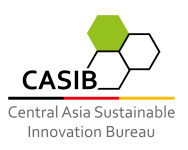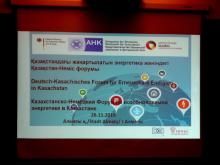On November 26, CASIB attended the symposium "German-Kazakh Forum for Renewable Energies in Kazakhstan" in Almaty, hosted by DEinternational within in the framework of the Export Initiative Energy ("Exportinitiative Energie") of the German Federal Ministry of Economic Affairs and Energy. Objective of the symposium was to provide local stakeholders and German delegates with a platform for information and contact exchange. Under the AHK service brandmark DEinternational, companies receive worldwide professional advice and support for the successful establishment and expansion of their business activities abroad.
Numerous stakeholders from the engery, education, and finance sector of both countries used the interactive format to discuss the current state and potential for development of renewable energies – specifically wind and solar power – in Kazakhstan from all relevant points of view.
The forum was opened by Christina Markert, consul general of Germany in Kazakhstan, and Hovsep Voskanyan, Delegate of the German Industry for Central Asia, with reference to the expansion of renewables energies being a core constituent of the EU's self-imposed climate goals as well as its Central Asia Strategy. In view of the development and goals of the energy transition in Germany, many speakers emphasized Kazakhstan's comparatively large potential for a similar shift of state and enterprise efforts considering the amount of availabe area, wind, and solar radiation.
David Wedepohl from the German Solar Association and Christoph Urbschat from the company eclareon jointly painted a comprehensive picture of the technical possibilities and the requirements for profitability and long-term success of a Kazakh energy transformation with German support. Their key message: The decisive factors for success are framework conditions, funding, and qualified professionals. Furthermore, the advantages of a decentralised energy supply with regard to employment, added value, and investments staying in the country were highlighted. In this context, Yerlan Dairbekov, project coordinator of UNDP Kazakhstan, showed several currently running initiatives as well as small-scale projects that were successfully made permanent in different parts of the country, including the utilised funding measures.
Also consulted were local experts like Nursultan Utkelbayev, lawyer at PricewaterhouseCoopers Kazakhstan, who contributed valuable practical knowledge about legal-institutional challenges for foreign investors – for instance regarding power-purchase contracts, insurance policies, custom regulations, inflation of the local currency, tariffs, requirements of local government agencies, authorisation choose, buy or lease the premises, as well as corruption – and presented specific solution strategies for these obstacles. Adding to this, Viktor Wiederspan, CEO of NWCOMP Solar GmbH, spoke about his long-time experiences with the establishment of solar energy compounds both in Germany and Kazakhstan and the country-specific obstacles that are to be taken into account to guarantee as smooth a procedure as possible. Between the different German suppliers that presented their products and services to the local expert audience, there emerged a comprehensive overview of the spectrum of targeted projects, ranging from roof-mounted systems for enterprises to meet their own demand to freestanding off-grid hybrid systems and extensive wind parks following Scandinavian examples. Self-sufficiency is at the core of many approaches, but Kazakhstan's future position as an energy exporter to Europe and China was addressed.
In light of the increasing confrontation with extreme weather events, the importance of consulting with climate change experts was repeatedly emphasised. The fact that the attending representatives highlighted their eagerness to support local partners is crucial for us at CASIB, as energy efficiency and sustainable energy systems are among the focal points of CLIENT II. In order to provide future projects in the energy sector with country-specific information and contacts as best we can, we continually inform ourselves about the latest developments through events like this one and raise attention for the programme among relevant stakeholders from the field of politics, research, and industry.
- Log in to post comments

